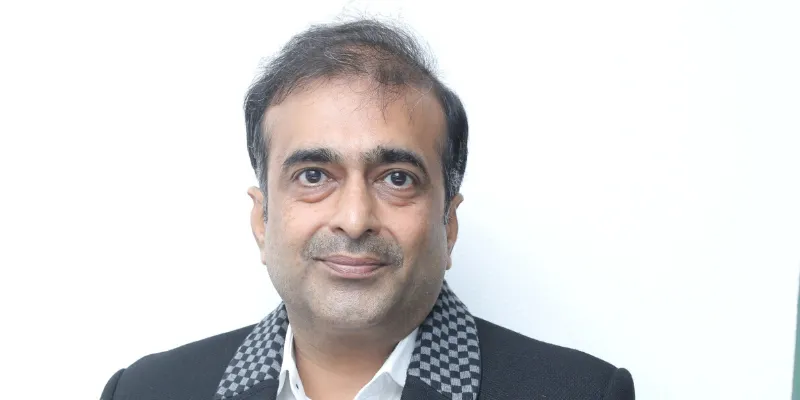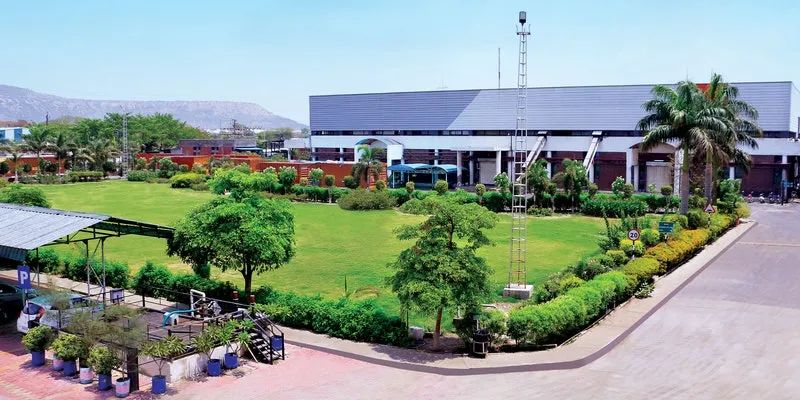Starting from a small room, this entrepreneur built a Rs 1,000 Cr snacks company
Prataap Snacks is a large-scale snacks manufacturer that runs nine manufacturing facilities, and has an extensive distribution network of 240 super-stockists and more than 4,100 distributors.
Luck did not seem to favour Amit Kumat when he decided to become an entrepreneur. Despite working in the snacks industry for a decade, he chose to become a chemicals manufacturer.
In less than a year, Amit was in Rs 6 crore debt. He shut the business, repaid his creditors, and contemplated his next move.
One day, Amit hit upon the idea to replicate the success of Peppy Cheese Balls. He realised that Indore was an under-penetrated market for snacks and he could retail his own version of cheese balls in northern and western India. The logistics seemed available in Indore.
With this idea in mind, Amit and his brother, Apoorva, approached a friend, Arvind Mehta, in 2002. They asked him to invest Rs 15 lakh so they could start a snacks company.
“We promised Arvind we would return the money if the venture did not work out. He agreed. In 2003, all three of us began functioning out of a tiny, 100 square feet office in Indore’s Navlakha locality. Our brand was then called Prakash Snacks, and we retailed cheese balls,” Amit says.

Amit Kumat, MD and CEO, Prataap Snacks
This time, Lady Luck smiled on Amit. He had hit the nail on the head and figured out the true potential of cheese balls in the region. Despite working out of a small office, sales began to soar.
Revenues reached Rs 22 lakh in the first year. In the third year, they went up to Rs 7 crore. The growth marked the end of his days in the small office.
Prakash Snacks became the launchpad for potato chips and namkeen brand Yellow Diamond. In 2010, they incorporated , and soon brought Prakash Snacks under it.
In 2017, the company was listed on NSE and BSE, and its IPO was oversubscribed 47 times.
Today, Prataap Snacks is a large-scale snacks manufacturer that runs nine manufacturing facilities and has an extensive distribution network of 240 super stockists and more than 4,100 distributors.
In the period April 2019 to December 2019, Prataap Snacks reported a total revenue of Rs 1,079.6 crore.

Apoorva Kumat, Executive Director, Operations, Prataap Snacks
In an exclusive interaction with SMBStory, Amit, who is now Managing Director and CEO of Prataap Snacks, shares his journey to success.
Edited excerpts from the interview:
SMBStory: What were your initial challenges? How were they resolved?
Amit Kumat: When we started, there were a few big organised players ruling the market. The market was small and difficult to penetrate. There were huge barriers.
Our target audience were the masses that were being overlooked by competitors. We focused on growing our presence in those areas, especially where logistics were easily available. Then we expanded to other regions.
We made products that had more snacks per pack, without compromising on the taste and quality. These factors helped us build a strong business and stay ahead of the curve.
Even now, we are cognisant of the fact that we are competing with several large and small companies, both from India and overseas. Many of these companies have larger budgets and reach.

Arvind Mehta, Executive Director and Chairman, Prataap Snacks
SMBS: What is the business model? What are your unique business strategies?
AK: The business started with the philosophy of giving better value to the consumer. The company launched potato chips packets with almost 30 to 35 percent more quantity than the market leader. We applied the same principle to our entire portfolio. The emphasis is on offering a value proposition to the price-conscious consumer by providing higher grammage.
In the initial years, we steadily built a presence in the urban markets of Mumbai and Delhi, the key distribution hubs of western and northern India.
We then set up a facility in Guwahati, and also entered South India. These facilities are strategically located to service different geographies effectively, and reap the benefits of being located close to raw material sources. We also built an expansive and well-entrenched distribution network spread across 27 states in India.
SMBS: What is the manufacturing process?
AK: Prataap Snacks operates through 14 manufacturing facilities, out of which five (in Indore, Guwahati, and Rajkot) are owned by us. The other facilities in Kolkata, Bengaluru, Ahmedabad, Kashipur, Hissar and Karjat are on contract manufacturing basis.
We manufacture sweet products at one of our facilities located in Indore, while all other facilities cater to salty products. To enable optimum efficiency in our distribution and to reach out to a more expansive market, we are increasingly employing an asset-light 3P (Production Preparation Process) third-party manufacturing model.
This model is based on proximity to the target market, enabling faster replenishments, and is expected to reduce freight costs. Along with lower logistics costs, the 3P model results in lower capex.
Going forward, this asset-light model will help in yielding better margins and thereby drive higher return on capital employed.

A Prataap Snacks factory
SMBS: How did you diversify into different product categories?
AK: Prataap Snacks holds three brands, including the parent Yellow Diamond brand, Rich Feast for sweet snacks, and the recently acquired Avadh brand. We created a diverse product portfolio at strategic price points and pack sizes, with more than 100 Stock Keeping Units (SKUs).
We started off with cheese balls and in 2005 decided to capitalise on the massive potato chips segment. We began manufacturing potato chips and rice/corn-based snacks, Chulbule.
In 2012, we commissioned a plant in Indore and introduced rings, namkeen, and wheels in the market. In 2014, we introduced scoops. Post the IPO in 2017, we launched nachos.
SMBS: How is the company using digital platforms for sales and marketing?
AK: The snacks manufacturing ecosystem has now evolved to reflect mature market offerings and customised products at reduced costs. The wave of change has enabled many manufacturers to rethink their strategies and ensure they upgrade themselves in order to stay relevant in the minds of consumers. It is an open secret that digital transformation is disrupting the conventional models of various industries, and the FMCG industry is also facing the heat.

Prataap Snacks' Yellow Diamond potato chips
Considering our close proximity to the target market, which helps in enabling faster replenishments, we do not depend too much on digital platforms for retailing. The major source of revenue is the Rs 5 packs, which are mostly purchased on ground. Online orders are generally placed for family packs.
SMBS: What are your plans for the future?
AK: The Indian packaged food and snacks industry comprising chips, extruded snacks, and namkeens is estimated at Rs 55,000 crore and has a predominantly unorganised presence. Organised players are estimated to have a 40 percent market share that is expected to grow. On the back of policy initiatives and increasing levels of awareness, the share of organised players is bound to increase.
So, we are excited about our prospects. First, we want to drive continued growth in the established portfolio of salty snacks by better penetrating existing markets and entering new ones. We also want to grow the Avadh business within Gujarat and neighbouring districts. Then we need to exploit synergies for Yellow Diamond products on the Avadh platform and vice versa.
Our sweet snacks portfolio is performing well, and we expect growth in this segment as well. The focus will be to take this product range across the entire distribution network and appropriately scale the category.
SMBS: How has the current coronavirus crisis affected your company and how are you dealing with it?
AK: The heat is being felt by Indian FMCG manufacturers, who are experiencing a sudden drop in performance as well as the performance of the sector. Prataap Snacks has witnessed an adverse impact on sales, and the plants have been shut since the lockdown.
We are keeping a close eye on the situation and trying to get permission for distribution of goods, which come under the essential commodities bracket.
(Edited by Javed Gaihlot)










